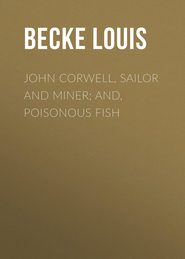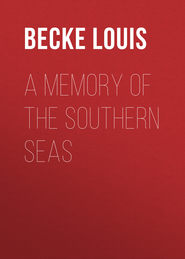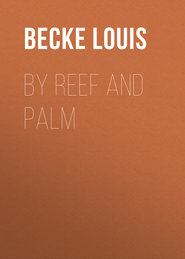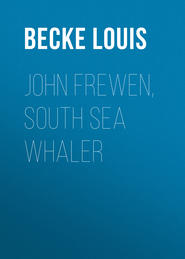По всем вопросам обращайтесь на: info@litportal.ru
(©) 2003-2024.
✖
The Strange Adventure Of James Shervinton
Настройки чтения
Размер шрифта
Высота строк
Поля
“No time have we for talk now, friends,” I said, jocularly slapping one of them on his brawny shoulders; “‘tis but this morning the king sent a white man to me in his own boat to bid me welcome; and, as we hurried down the lagoon, that devil’s rain sent me astray, so that the boat was caught in the current and swept down into the passage, where we struck, as thou seest.”
My explanation was quite satisfactory, and they went to work with a will, lightening the boat—after a first and fruitless attempt to move her—by taking out all our water, stores, &c. We were but fifty or sixty feet away from the edge of the channel; and in half an hour, by our united effort, had dragged her half the distance, when Niâbon beckoned me to her.
“There are two boats half-way down the lagoon,” she said in a low voice: “one is that of Tully, and they are using both sails and oars. See, they are plainly in sight.”
I jumped back again amongst the natives. I knew that they would have already seen the coming boats had they not been toiling so hard, so I called to Niâbon to open another bottle of grog and serve it out.
“Hurry, hurry, O strong men,” I cried, as we moved the boat another foot astern, “else shall I be laughed at by the king’s white men, for two boats are coming. And instead of twenty it shall be forty sticks of tobacco each if ye get this boat in the water before the king’s men are here to laugh at me.”
The poor beggars were working like Trojans, their naked bodies streaming with perspiration, as Niâbon held out to each of them half a pannikinful of raw gin, which was tossed off at one swallow. Then both she and Lucia, who was now on the reef, began digging the promised tobacco out of a case with sheath knives.
“Don’t bother to count the sticks!” I cried, as the boat made a sudden move and was kept going for nearly a dozen feet. “Toss out about half of the case and be ready to jump on board and get under cover.”
At last, with a yell of satisfaction from the natives, the stern post was seen to be over the ledge of the coral, and then with one final effort the boat went into the water with a splash like a sperm whale “breaching.”
“Now, in with everything,” I shouted to Tematau, as one glance showed me the two boats, now less than half a mile away, coming along at what seemed to me to be infernal speed.
Tematau and the natives made a rush at the boxes of stores, bundles of sails, water breakers, and everything else, and tumbled them on board anyhow, Lucia and Niâbon taking the lighter articles from them and dropping them into the cabin, so as to give us more deck room, whilst I ran up the jib, and big Tepi the mainsail.
“Take all the loose tobacco there, my friends,” cried Niâbon to the fishermen, who with panting bosoms stood looking at us as if we had all gone mad, “and here are the four bottles of rom.”
One of them sprang to the side of the boat just as I, feeling every moment that I should drop with exhaustion, pushed her off with an oar into deep water. And then we heard a chorus of yells and cries from the two boats, as we eased off the jib and main sheets, and Niâbon put her before the wind. Then crack! crack! and two bullets went through the mainsail just below the peak, and I heard Tolly’s voice shouting to me to bring to again.
“Come aft here, you two,” I cried to Tepi and his mate; “get out the guns, quick. Sit down in the cabin and fire, one on each side of me.”
I did not speak a moment too soon, for the leading boat suddenly lowered her sail, took in all her oars but two, and began firing at us at less than three hundred yards, and every bullet hit us somewhere, either in the hull or aloft. Then they took to their oars again, and I saw that unless we could knock some of them over she—and those in the second boat as well—would be aboard of us in a few minutes, for there was now but little wind and the strength of the ebb tide was fast slackening.
Tematau and Tepi each fired two or three shots in quick succession, but missed, and then a very heavy bullet struck the side of the coaming of the steering-well in which I was seated, glanced off and ploughed along the deck, and the second boat now began firing into us with breechloading rifles of some sort.
“Let me try,” I said to Tematau, clambering out of the well into the cabin. “Go and steer, but sit down on the bottom, or you’ll be hit.”
Niâbon handed me my Evans’ rifle in the very nick of time, for at that moment Tully stood up in the stern sheets of his boat and, giving the steer oar to a native, began to take pot shots at Tepi and myself. I waited until my hand was a bit steady, and then down he went headlong amongst his crew. I knew I could not possibly have missed him at such a short distance.
“Good!” cried Niâbon exultingly, as both Tepi and myself fired together and three of the native paddlers who were sitting facing us, rolled over off their seats, either dead or badly wounded, for in an instant the utmost confusion prevailed, some of the crew evidently wanting to come on, and the others preventing them. By this time the first boat was within easy pistol range the other, which was much larger and crowded with natives, being about forty yards astern of her, but coming along as hard as she could, two of her crew in the bows firing at us with a disgusting kind of a foreign army rifle, whose conical bullets were half as big as pigeon’s eggs, and made a deuce of a noise, either when they hit the Lucia, or went by with a sort of a groanlike hum.
“Take this,” I said to Niâbon, giving her my Deane and Adams pistol, “and do you and Tepi keep off those in the nearest boat if they come on again.”
But she waved it aside, and seizing Tematau’s carbine, stood up and sent her first shot crashing through the timbers of the boat.
“Quick, Tematau,” I cried, “get another rifle and fire with me at the second boat. Let ours come to the wind—it matters not.”
Picking out one of the two fellows who were shooting so steadily at us from the bows of their boat, I fired and missed, but another shot did for him, for he fell backwards and I saw his rifle fly up in the air and then drop overboard.
This was enough for them, for the steersman at once began to slew her round, and then he too went down as a bullet from Tematau took him fair and square in the chest, and we saw the blood pouring from him as he fell across the gunwale. In another ten seconds they were paddling away from us, leaving the other boat to her fate.
“That is enough,” I cried to Tepi, who I now noticed for the first time was bleeding from a bullet wound in the left arm, which had been hurriedly tied up by Lucia, “that is enough. Put down your gun. There is now no one in the second boat shooting at us.”
“They are lying down in the bottom,” said Niâbon, “we can see them moving, but some have dived overboard, and swum ashore. See, there are four of them running along the reef.”
“Let them go, Niâbon,” and then I turned to Lucia. She was deathly pale, but had all her wits about her, for although she could barely speak from excitement, she had some brandy and water ready for us.
“Thank you,” I said, as I poured a stiff dose into the pannikin, and taking first pull, passed it on to Tepi and the other man. “Now we must have a look at that boat. We can’t leave wounded men to drown.”
The wind was now very light, but the boat was so near that we were soon alongside and looking into her. There were three dead, two badly wounded, one slightly wounded man, and one unhurt man in her. The latter looked at us without the slightest fear, even when Tepi, picking up a carbine, thrust the muzzle of it almost into his face. Niâbon gently took the weapon from Tepi’s hand, laid it down and waited for me to question our prisoner.
“Is the white man dead?” I asked.
“Ay, he died but now. The bullet went in at where the ribs join.”
To make sure that Tally was really dead I got down into the boat. He was lying on his face and was dead enough, though he had evidently lived until a few minutes previously.
I jumped on board the Lucia again, and looked anxiously around. There was still a light air, but the tide was now setting in, and I did not want our boat to be carried back into the lagoon again. Then I turned to the prisoner, and asked him if he could tell me why he ought not to be shot. He made a gesture of utter indifference, and said he didn’t care. Did I think he was a coward, he asked? Could he not have swum ashore? The king would kill him to-morrow.
Pitying the poor wretch, I gave him a pipe, tobacco, and matches, and told him to help my men put the dead and wounded men on the reef, as I wanted the boat. The people at the fishing village, who had been watching the fight throughout from a safe distance, were within sight, so telling the prisoner he must go to them and get them to carry their dead and wounded up to the houses before the tide covered the reef again, I sent him off with Tematau, Tepi, and Niâbon. Their gruesome task was soon done, and the boat rid of her ensanguined cargo; then as soon as she came alongside again, I called Niâbon on board, and telling her to steer, went into the smaller boat and took the Lucia in tow.
As we slowly crept out through the passage, we saw the fisher folk come down to the reef, and, lifting up the three dead men, carry them away, others following with the wounded. It was not a pleasant sight to see, nor even to think of, now that it was all over, and so we none of us spoke as we tugged at the oars.
We got outside at last, and then ceased towing, as a light air carried us well clear of the outer reef. Coming alongside, we stepped on board, after having pulled out the boat’s plug. Then we watched her drift astern to fill.
At dawn when I was awakened, after a good four hours’ sleep, Apamama was thirty miles astern of us, and we were running free before a nice cool breeze, steering N.W. for Kusaie Island, the eastern outlier of the Carolines, eight hundred miles away.
The two women had not heard me move, and were both sound asleep, their faces close together and their arms intertwined.
CHAPTER XIII
We were thirteen long weary days between Apamama Lagoon and Kusaie, whose misty blue outline we hailed with delight when we first sighted it early one afternoon, forty miles away.
Calms and light winds had delayed us greatly, for as we crawled further northward, we were reaching the limit of the south-east trades, which, at that time of the year, were very fickle and shifty. Not a single sail of any description had we seen, though we kept a keen lookout night and day; for, after being ten days out from Apamama, I began to feel anxious about our position and would have liked to have spoken a ship, fearing that the current, in such calm weather, would set us so far to the westward that I should have difficulty in making the island if we once got to leeward of it.
Day after day had passed with the same unvarying monotony—light winds, a calm, then a brisker spell of the dying trades for a few hours, or a day at most—then another calm lasting through the night, and so on.
But our spirits very seldom flagged, and we contrived to make the time pass somehow. Lucia, whose face and hands were now browning deeply from continuous exposure to the rays of a torrid sun worked with Niâbon at dressmaking, for she had brought with her half a dozen bolts of print; and, as they sewed, they would sometimes sing together, whilst I and my two trusty men busied ourselves about the boat—scrubbing, scraping and polishing inside and out, cleaning and oiling our arms; or, when a shoal of bonita came alongside, getting out our lines and catching as many of the blue and marbled beauties as would last us for a day or two. But our chief relaxation, in which the two young women always joined us, was two or three hours of “sailors’ pleasure” i.e., overhauling all our joint possessions, clothing, trade goods of all sorts, and carefully restowing them in the boxes in which they were packed.
Tepi’s wound by this time was quite healed—the bullet had gone clean through the fleshy part of his arm, and then struck an oar which was lashed to the rail. He had got a nail from me and drove it through the lead into the wood—to be preserved as a memento of the fight.
On the evening of the day on which we sighted the blue peaks of beautiful Kusaie, the sky began to look ugly to the eastward, and at daylight it was blowing so hard, with such a dangerous sea, that I decided not to attempt to enter the weather harbour—Port Lelé—though that had been my intention, but to run round to the lee side to Coquille Harbour, where we could renew our fresh provisions, spell a day or two, and be among friends, for I knew the people of Kusaie pretty well.
We got into the smooth water of Coquille just in time, for no sooner had we dropped anchor at the mouth of a small creek which debouched into the harbour through a number of mangrove islets, than it commenced to blow in real earnest, and terrific rain squalls drenched us through and made us shiver with cold.
The natives, however, had seen us, and presently, as soon as the rain ceased, three canoes appeared, each manned by five men. They welcomed us very heartily and urged us to come to the village—which was less than a quarter of a mile away. We were only too delighted to get ashore again after thirteen days’ confinement on our little craft, so hurriedly packing a couple of boxes with dry clothing, and some articles for presents for the people, we put on the cabin hatches, made everything else snug on board, and half an hour later were all in the chiefs house, warm and dry, and telling him and his family as much about ourselves as we thought advisable.
As soon as it could be cooked, they brought us an ample meal of hot baked fowls, pigeons, and fish, with a great quantity of vegetables—taro, yams, breadfruit, and sweet potatoes. The very smell of it, Tepi whispered to me, made his teeth clash together!
We remained with these hospitable people for four days. There was nothing that they would not do for us—no trouble was too groat, no labour was aught but a pleasure to them. They brought the Lucia round to a small sandy beach near the village, discharged her, carried everything up to the houses, and cleaned her thoroughly inside and out, and then put her in the water again for us. When we bid them farewell and sailed, the boat’s deck was covered with baskets of freshly-cooked food and a profusion of fruit, and Lucia and Niâbon were accompanied on board by every woman and girl in the place, some of whom wept unrestrainedly, and begged them not to venture their lives in such a small boat, but to remain on the island till a ship touched there, bound to the islands of the further north-west.
Before finally parting with our kind friends I gave them twenty pounds of tobacco, which, though we had still four hundredweight left, was still our most valuable trade article, and would have to be disbursed carefully in future, and Lucia gave the chief’s daughter a very handsome gold ring of Indian manufacture, though at first the girl declined accepting so valuable a present.
We lost sight of Kusaie within ten hours, for we had a slashing breeze, which carried us along in great style, and all that night we sat up, none of us caring to sleep, for there was a glorious silver moon in a sky of spotless blue, and the sea itself was as a floor of diamonds.











